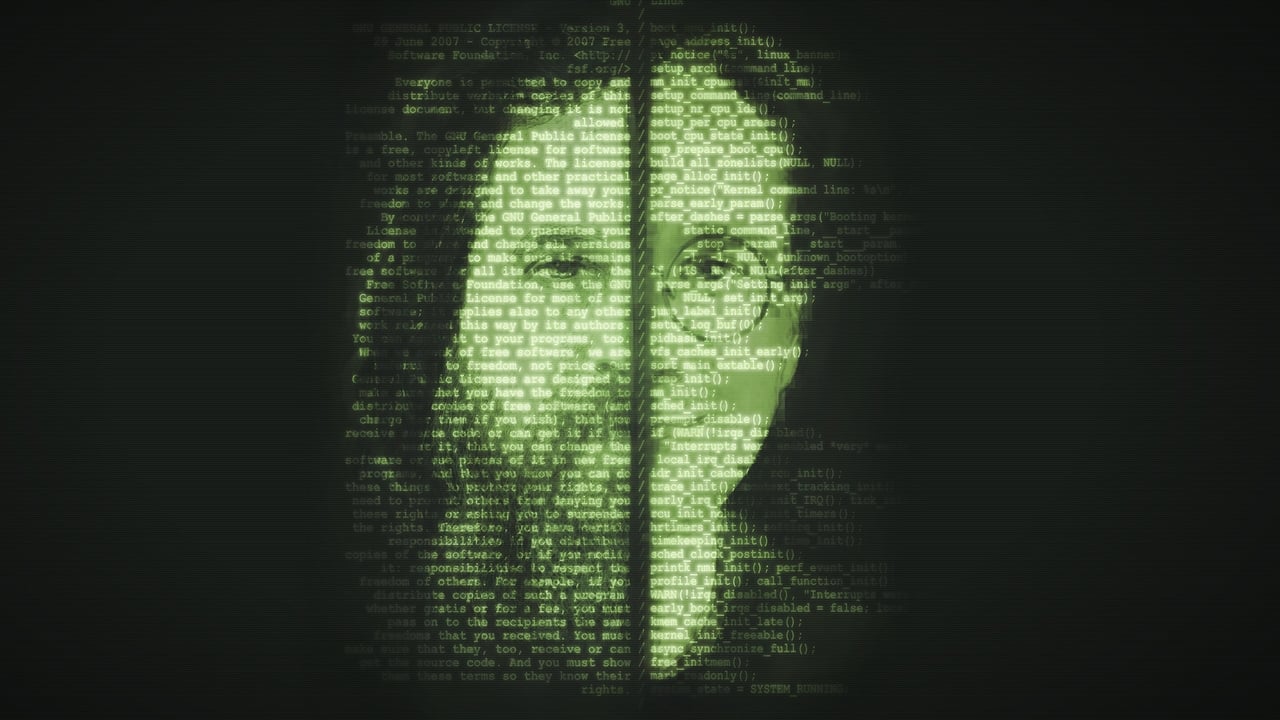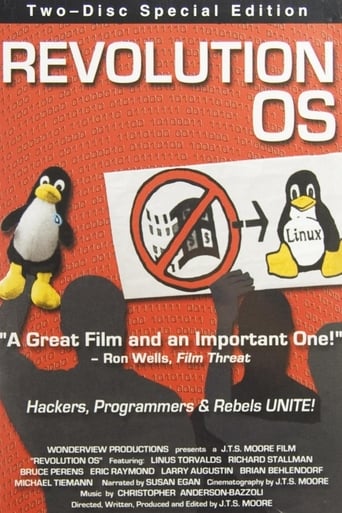ClassyWas
Excellent, smart action film.
GarnettTeenage
The film was still a fun one that will make you laugh and have you leaving the theater feeling like you just stole something valuable and got away with it.
Zlatica
One of the worst ways to make a cult movie is to set out to make a cult movie.
Logan
By the time the dramatic fireworks start popping off, each one feels earned.
budmassey
An interesting "documentary." If only it were true.This movie might just as well have been titled "Revenge of the Nerds: Nerds Destroy Microsoft." Don't worry about the intellectual property issue that someone else owns the rights to the names "Revenge of the Nerds" and "Microsoft." Intellectual property obviously isn't very important to people who champion an operating system built by systematically reverse engineering and copying, piece by piece, someone else's operating system.Except the nerds didn't destroy Microsoft. In the second decade of the 21st century, Microsoft still has a 90% market share and MacOS is its only real competitor. Admittedly, Linux never expressed an interest in market domination, but this movie's tales of Linux's triumph over Windows are greatly overstated.Two of the great success stories presented in the movie; Cygnus and VA Linux, simply no longer exist as presented. Cygnus was absorbed by Red Hat even before the movie was released, and VA Linux abandoned its business model, becoming an entirely new company with a new value proposition shortly thereafter, when a disastrous crash in its stock price proved its original value proposition was indeed weak as it had originally been described.The movie presents absolutely no data from "the other side" other than a letter written by Bill Gates in 1976, when he was twenty and Microsoft had not even been incorporated. Moreover, the letter is read by a woman whose voice borders on a rage-induced hysteria accompanied by a disturbing and ominous soundtrack. I wonder how rational Torvalds would sound with a lurid Berlioz soundtrack accompanying a lunatic's recitation.What is most disturbing/amusing/annoying is the constant insistence by commentators on comparing Linux with Windows NT. Let's see, Microsoft hasn't released a product under that name for more than a decade, so perhaps, if we are to insist on that comparison, we should be examining Windows NT, released in 1993, with Linux 1.0, released in the same year. Now that would be interesting.In the end, this movie has the tone and sentiment of a poorly made propaganda film, and about as much intellectual honesty. Linus Torvalds actually seems slightly bitter at the success other people have achieved through Linux, and he remains unrepentantly in denial of Linux's origins in the GNU project. Many of the other commentators seemed to focus far too much on establishing their geek cred by claiming to have been doing "X" longer than anyone or having done "Y" first. Eventually, their endless ranting exalting themselves and their ideas became simply tiresome and made them appear more ridiculous than authoritative.The one person who didn't come across as an embittered deludinoid is Richard Stallman himself. Stallman, despite a widely held public perception to the contrary, seems a rational and sincere advocate for his own ideals, however naïve they may be. It is perhaps ever so slightly disingenuous for Stallman to advocate working for nothing and giving your work away when he has been the recipient of numerous grants, including the MacArthur Grant – the sizable so-called "genius" grant from the John D. & Catherine T. MacArthur Foundation. Nevertheless, this movie made Stallman seem, to me, quite genuine and even likable.I would call this movie a dramatization, not a documentary. It is definitely entertaining; a delightfully comic, though unintentionally so, look inside the bizarre open source community and their zealous, almost religious devotion to an operating system that, notwithstanding all the declarations of victory to the contrary, has never managed a significant market penetration and, in its prevalent forms, in all likelihood, never will.
Mikael
If this really is a serious attempt for making a documentary it tries to cover so many areas that it should have been made a series instead. It fails to give a proper history of open source/free software. It fails to recreate the role of open source/free software during the period of focus, namely the dot com boom and crash of 1997-2001. It fails to give any new insights, even for the year it was made. And it fails miserably to have any kind of objectivity or dialogue.The value of this movie are the interviews with the key persons of the various open source and free software movements, though it becomes quite tiresome to sit and wait for the goodies. What really brings the credibility down is the overly hostile reading of the letter by Bill Gates and the traditional Microsoft bashing through the entire production, combined with the heroic soundtrack during the interviews of the "good guys". It gives the over all impression of really being a sales pitch for a church from a bunch of overly enthusiastic believers, though without the visionary parts that can make it a document of its context of production.In conclusion, even though far between, there are some good bits in this documentary that could make it worth watching if you have a special interest in the open source movement. Just be aware that you might also get some chills of embarrassment in between.
Ralph Michael Stein
My fourteen-year-old boy is very much into computers (that's hardly surprising). This summer he'll be back with the Johns Hopkins University Center for Talented Youth program studying - I don't really know exactly what. It's some kind of computer program, I just sign the check.He's very much both anti-Microsoft and anti-Bill Gates. He's also quite pro-Linux, the emblem of the "Open Source" movement whose adherents regard its underlying virtues with a devotion normally reserved by the religious for the icons of their faiths.So he wanted me to see "Revolution OS," a documentary about the Linux operating system and the open source movement that spawned the increasingly important competitor to both Microsoft and Apple.This is a very interesting documentary which I, clueless as to the secrets of operating systems, readily understood. I watched it with the barest comprehension of Linux or the philosophy underlying the open source concept.Much credit to the filmmaker for not only explaining the seminal value of open source - the commitment to free interchange of ideas with minimal incorporation of legal protection for intellectual property - but for also succinctly allowing contrasting values and competing personalities screen time. This documentary is a very concise but excellent guide for the uninitiated into a world usually the arcane preserve of specialists most adept at talking to each other.The Open Source movement is a work in progress threatened by the real risk of those benefiting from openness legally protecting their own "added value" and thus, in a sense, betraying their benefactors. Several of those interviewed pursue their open source values almost as a creed, the commitment to computers taking the place of more traditional dogma.Anyone interested in a major intellectual counterpoint to the dominance of both Microsoft and the role of law in insuring proprietary benefits for innovators should see "Revolution OS": no manual required.8/10.
presto8
A nice documentary about the open source software revolution. None of the material presented here will come as a surprise to the computer techies out there, but the interview format of the film does give a feel for the personalities involved, including Linus Torvalds, Richard Stallman, Bruce Perens, and Eric Raymond. What is most intriguing is how each person is portrayed as feeling that their contribution to the open source community stands out as the most important part of the revolution: Torvalds' Linux, Stallman's GNU Project, Raymond's "The Cathedral and the Bazaar", Perens' "Open Source Definition", and Behlendorf's Apache. Whether these people truly feel this way or whether it is attributable to creative editing is an exercise left to the viewer.

